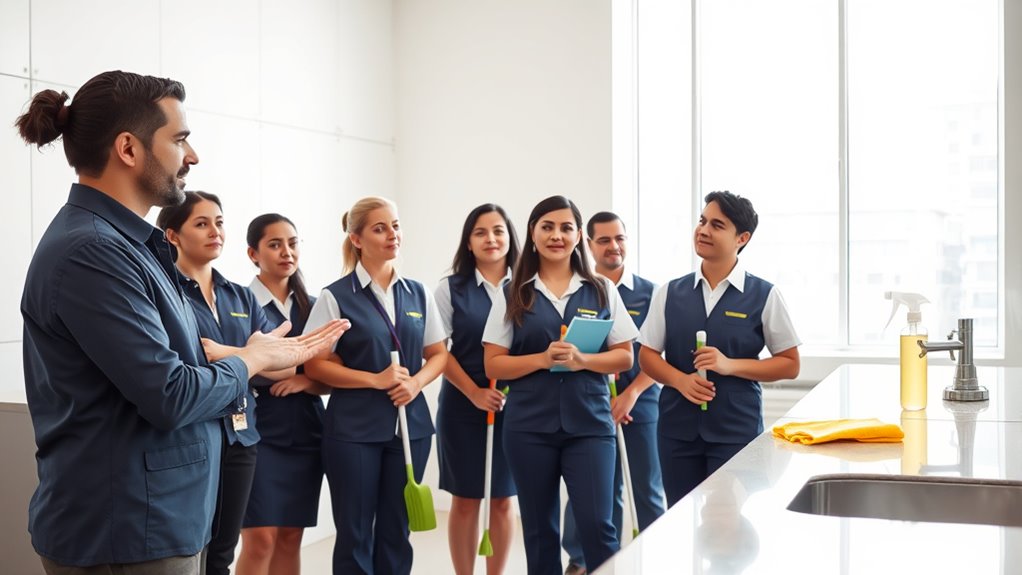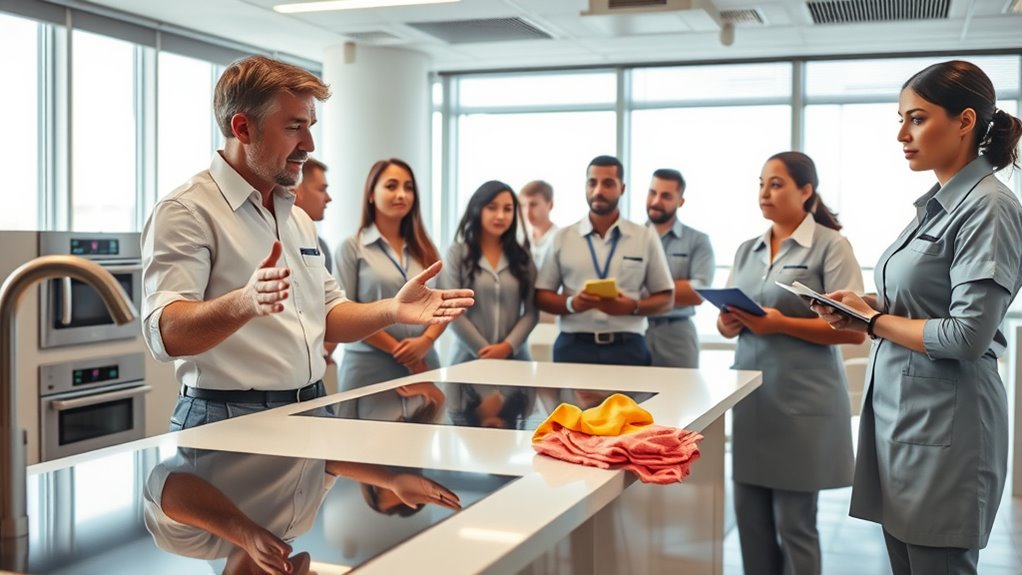To guarantee your cleaning staff deliver consistent quality service, focus on providing thorough training that covers equipment use, safety protocols, and proper techniques. Engage your team by recognizing their efforts and involving them in decision-making, which boosts motivation. Use visual aids, demonstrations, and regular refresher courses to reinforce skills. Create a positive environment by offering constructive feedback and addressing mistakes as growth opportunities. Keep exploring these strategies to maintain high standards and motivated staff.
Key Takeaways
- Implement comprehensive training covering equipment operation, safety protocols, and cleaning techniques to ensure consistency and safety.
- Use visual aids, demonstrations, and practical exercises to reinforce learning and improve skill retention.
- Foster staff engagement by involving employees in decision-making, recognizing efforts, and providing incentives.
- Conduct regular refresher courses and introduce new techniques to keep skills current and motivate continuous improvement.
- Create a supportive environment that addresses mistakes constructively, encouraging ongoing development and high-quality service.

Training your cleaning staff is essential for maintaining high standards and ensuring a safe, efficient workspace. When you focus on proper training, you’re equipping your team to use cleaning equipment correctly, which directly impacts the quality of their work and the longevity of your tools. Proper handling of equipment such as vacuum cleaners, floor buffers, and sanitizing devices not only improves cleaning results but also prevents damage and reduces maintenance costs. To achieve this, you should develop a thorough training program that covers the correct operation of all cleaning tools and emphasizes safety protocols. Demonstrating how to use each piece of equipment properly helps staff perform their tasks efficiently and minimizes the risk of accidents.
Proper cleaning staff training ensures equipment longevity, safety, and high-quality results through correct handling and safety protocols.
Including hands-on demonstrations and practical exercises can significantly enhance learning and retention. Staff motivation plays an indispensable role in effective training. When your team feels valued and understands the importance of their role, they are more likely to engage actively in training sessions and take pride in their work. Recognize their efforts regularly, and involve them in decision-making processes related to cleaning practices. When staff see that their input matters, they develop a sense of ownership and responsibility, which boosts morale and encourages consistency. Additionally, providing incentives or rewards for mastering new skills can motivate your team to improve continuously, making training a positive experience rather than a chore.
Clear communication during training is essential. Use straightforward instructions and encourage questions to ensure everyone understands how to operate cleaning equipment properly. Visual aids, hands-on demonstrations, and step-by-step guides can reinforce learning and help staff retain information better. Regular refresher courses are also important because they keep skills sharp and introduce new techniques or equipment that may improve efficiency. When your employees are confident in their abilities, they’re more likely to take initiative and deliver consistently high-quality results.
Creating a supportive environment is equally important. If mistakes happen, address them without discouraging your staff. Instead, view errors as opportunities for learning and growth. Offer constructive feedback and provide additional training if needed. This approach not only improves the skill set of your team but also fosters a culture of continuous improvement. Remember, motivated staff who feel supported are more engaged and committed to maintaining the high standards you set. By investing in thorough training that emphasizes proper use of cleaning equipment and staff motivation, you’re building a reliable, professional team capable of delivering consistent, exceptional cleaning services every time.
Frequently Asked Questions
How Often Should Cleaning Staff Receive Refresher Training?
You should schedule refresher training for your cleaning staff at least every six months to maintain high standards. Regular updates help reinforce cleaning schedules, guarantee staff hold current certifications, and stay informed about new techniques or products. Consistent training keeps your team motivated, minimizes mistakes, and guarantees consistent quality service. By prioritizing ongoing education, you create a reliable, professional cleaning crew that meets your standards every time.
What Are Common Challenges Faced During Cleaning Staff Training?
Like steering a maze, training your cleaning staff faces challenges such as employee turnover and communication barriers. You might find it difficult to keep everyone up-to-date or guarantee consistency. These hurdles can cause confusion and reduce service quality. To overcome them, focus on clear communication, regular refresher sessions, and fostering team stability. Addressing these issues head-on helps your team deliver consistently clean results, much like a well-orchestrated symphony.
How Can I Motivate Cleaning Staff to Maintain Quality?
To motivate your cleaning staff to maintain quality, you should implement recognition programs that celebrate their achievements. Performance incentives, like bonuses or rewards, encourage them to excel consistently. Make sure to provide regular feedback and acknowledge their efforts openly. When staff feels valued and appreciated, they’re more likely to stay committed to high standards. Keep motivation high by creating a positive work environment and rewarding excellent performance consistently.
What Tools Are Best for Training Cleaning Staff Effectively?
Imagine your cleaning staff as artists; the right tools make all the difference. To train effectively, use cleaning checklists to set clear expectations and hands-on demonstrations to build confidence. These tools turn abstract instructions into practical skills, ensuring consistency. By combining checklists with real-time practice, you empower your team to perform at their best every time, creating a culture of excellence that sticks.
How Do I Assess the Skills of New Cleaning Employees?
To assess the skills of new cleaning employees, you should conduct a thorough performance evaluation and skill assessment during their initial training period. Observe their cleaning techniques, attention to detail, and punctuality. Ask for feedback and set clear benchmarks. This approach helps you identify strengths and areas needing improvement, ensuring they meet your standards for consistent, quality service. Regular follow-ups will also maintain high performance standards.
Conclusion
By investing time and effort into proper training, you create a foundation where your cleaning staff can truly shine. When your team feels confident and well-guided, every surface they touch glows with care, turning routine tasks into moments of pride. Remember, a little nurturing goes a long way—helping your staff blossom into dependable professionals who elevate your service. With patience and consistency, you’ll cultivate a reputation that’s as spotless as the spaces you maintain.










